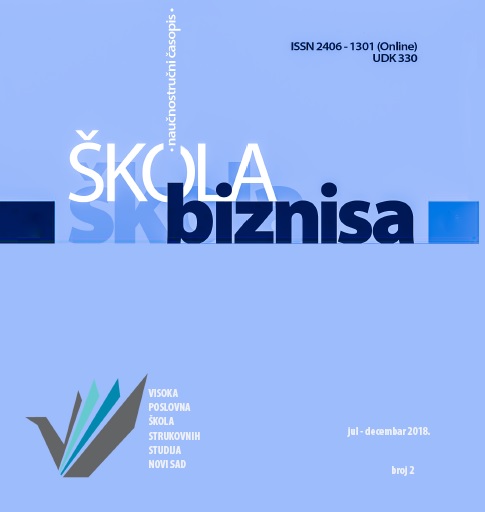THE QUESTION OF ENERGY AND CONSIDERATION OF ITS PLACE AND IMPORTANCE IN CLASSICAL AND NEOCLASSICAL THEORY OF GROWTH AND DEVELOPMENT
Abstract
Energy is crucial in all processes, including the process of economic growth. The process of economic growth involves the transformation of raw materials into the final product, which means the use of energy. The paper examines the importance of energy for contemporary economic development and points to the necessity to move from the use of non-renewable to the use of renewable energy resources. The undoubted connection between economic growth and energy consumption, as well as the divergent views of economic researchers regarding the causality of economic growth and energy consumption, was established, which is of crucial importance in the creation of energy policies of individual countries. The dominant position in economic science is confirmed by which the energy in classical theory is implicitly included in economic activity across the country as a key factor of production. On the contrary, in neoclassical economic theory energy was not recognized as an important productive factor, which at the same time represents one of its most pronounced weaknesses.
References
Allen, R. (2009). The British industrial revolution in global perspective. Cambridge: Cambridge University Press.
Ang, B. (2006). Monitoring changes in economy-wide energy efficiency: from energy–GDP ratio to composite efficiency index. Energy Policy, 34(5), 574-582.
Alam, M. (2008). Bringing energy back into the economy, Department of Economics, Northeastern University, Boston, Working Paper.
Apergis, N., El-Montasser, G., Sekyere, E., Ajmi, A. N., & Gupta, R. (2014). Dutch disease effect of oil rents on agriculture value added in Middle East and North African (MENA) countries. Energy Economics, 45, 485-490.
Cleveland, C., & Constanza, R. (2008). Biophysical economics. In Cleveland, C. (Ed.), Encyclopedia of Earth, Environmental Information Coalition. Washington: National Council for Science and the Environment.
Caraiani, C., Lungu, C., & Dascălu, C. (2015). Energonsumption and GDP causality: A three-step analysis for emerging European countries. Renewable and Sustainable Energy Reviews, 44, 198-210.
Cvetanović, S., & Despotović, D. (2014). Kapital, održivi razvoj i ekonomska politika. Niš, Republika Srbija: Filozofski fakultet Univerziteta u Nišu.
Cvetanović, S., Kostić, V., & Milačić, Lj. (2016). Evropska unija. Priština, Republika Srbija: Ekonomski fakultet.
Despotović, M. (2011). Obnovljivi izvori energije.
Kragujevac, Republika Srbija: Fakultet inženjerskih nauka.
Dragutinović, D., Filipović, M., & Cvetanović, S. (2016). Teorija ekonomskog rasta i razvoja. Beograd: Centar za izdavačku delatnost Ekonomskog fakulteta Univerziteta u Beogradu.
Erić, M. (2016). Ekonomski razvoj i energetska efikanost: modelovanje odnosa i meta-analiza (Doktorska disertacija). Beograd: Univerzitet Singidunum.
Hamilton, J. (2009). Causes and Consequences of the Oil Shock of 2007-08. National Bureau of Economic Research.
Imran, K., & Siddiqui, M. (2010). Energy Consumption and Economic Growth: A Case Study of Three SAARC Countries. European Journal of Social Sciences, 16(2), 206-213.
Jakovac, P., & Vlahinić Lenz, N. (2015). Uloga energije s aspekta ekonomske teorije, Ekonomski pregled, 66(6), 527-557.
Jovanović-Gavrilović, B., (2013). Privredni razvoj sa ljudskim likom. Beograd: Centar za izdavačku delatnost Ekonomskog fakulteta Univerziteta u Beogradu.
Kander, A., & Stern, D. (2014). Economic growth and the transition from traditional to modern energy in Sweden. Energy Economics, 46, 56-65.
Mandal, Š., Mihajlović Milanović, Z., & Nikolić, M. (2010). Ekonomika energetike: strategija, ekologija i održivi razvoj. Beograd: Centar za izdavačku delatnost Ekonomskog fakulteta Univerziteta u Beogradu.
Nafziger, E. (2012). Economic development. New York: Cambridge University Press.
Ockwell, D. (2008). Energy and economic growth: Grounding our understanding in physical reality. Energy Policy, 36(12), 4600-4604.
Saks, Dž. (2014). Doba održivog razvoja, Beograd: Centar za međunarodnu saradnju i održivi razvoj i Službeni glasnik.
Sredojević, D., Cvetanović, S., & Bošković, G. (2016). Technological Changes in Economic Growth Theory: Neoclassical, Endogenous, and Evolutionary-Institutional Approach. Economic Themes, 54(2), 177-194.
Stern, D. (2011). The role of energy in economic growth. Annals of the New York Academy of Sciences, 1219(1), 26-51.
Todaro, M., & Smith, S. (2015). Economic development. Boston: Pearson.
Vlahinić-Dizdarević, N., Žiković, S. (2011). Ekonomija energetskog sektora – izabrane teme. Rijeka: Ekonomski fakultet Sveučilišta u Rijeci.
Wrigley, E. (2010). Energy and the English Industrial Revolution. Cambridge University Press, Cambridge.
- Authors retain copyright and grant the journal right of first publication with the work simultaneously licensed under a Creative Commons Attribution License that allows others to share the work with an acknowledgement of the work's authorship and initial publication in this journal.
- Authors are able to enter into separate, additional contractual arrangements for the non-exclusive distribution of the journal's published version of the work (e.g., post it to an institutional repository or publish it in a book), with an acknowledgement of its initial publication in this journal.
- Authors are permitted and encouraged to post their work online (e.g., in institutional repositories or on their website) prior to and during the submission process, as it can lead to productive exchanges, as well as earlier and greater citation of published work (See The Effect of Open Access).

